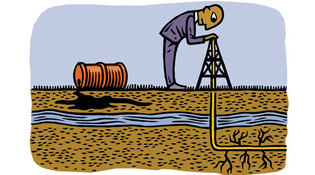 loading
loading
FindingsFracking and drinking waterDoes it pose a risk?  Gregory NemecView full imageRather suddenly, the United States is flush with natural gas. Innovative hydraulic fracturing technologies that inject millions of gallons of chemical-infused water into rock beds deep below earth’s surface, splitting them apart, have opened access to new reserves. “But there’s a really hot debate right now about whether hydraulic fracturing is causing groundwater contamination,” says Brian Drollette ’17PhD, a student in chemical and environmental engineering. In a critical contribution to this debate, Drollette and a team of researchers found that hydraulic fracturing specifically—the injection of water deep underground—does not appear to pollute groundwater, but the ground-level industrial processes of fracking can. “It is not necessarily the hydraulic fracturing process...that can lead to groundwater contamination, but rather, the existence of the operation itself,” they write in an article published in the Proceedings of the National Academy of Sciences. Human error and mechanical failure at the wellheads seem to be responsible for water pollution. To uncover these results, Drollette traveled to the Marcellus Shale formation of northeastern Pennsylvania, where hydraulic fracturing has exploded over the last several years. He collected water samples on properties near fracturing wells and, through sophisticated analysis not typically available in commercial labs, found additives linked to hydraulic fracturing. But the team concluded, based on the relative age of the water, that the pollution came from surface operations rather than deep underground.
The comment period has expired.
|
|